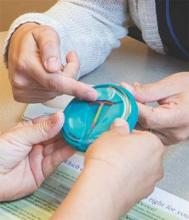Compared with women using copper IUDs, women using depot medroxyprogesterone acetate, the contraceptive ring, and the implant were more likely to report a lack of interest in sex in a survey.
Women reporting side effects are twice as likely to discontinue their oral contraceptive pills and subsequently are at risk for unintended pregnancy. Further, sexual side effects have been reported by one in five women taking oral contraceptives, despite research indicating little impact on sex drive in most women taking the drugs. In this study, Dr. Jeffrey Peipert of Washington University, St. Louis, and his colleagues sought to clarify whether there is any association between other forms of hormonal contraception and effects on sexual desire.
The researchers performed a cross-sectional analysis of data from the Contraceptive CHOICE Project 6-month survey. The Contraceptive CHOICE Project was a prospective cohort study of 9,256 women that aimed to promote reversible, long-acting contraceptive methods and lessen barriers to all forms of contraception.
Complete data were available on 1,938 participants who had a mean age of 25 years. Half of the participants were black, 51% were nulliparous, and 59% had never married or were single. The contraception methods used included the levonorgestrel IUD (43%), the subdermal contraceptive implant (23%), the copper IUD (14%), oral contraceptive pills (7%), depot medroxyprogesterone acetate (DMPA) (6%), the contraceptive vaginal ring (5%), and the contraceptive patch (2%).
Overall, 23.9% of the study participants reported lacking interest in sex for several months or more. Women reporting a lack of sexual interest were more likely to be black (odds ratio, 2.23), and living with a partner or married (OR, 1.51). Women who had more children, reported depression or poor health, and had a low socioeconomic status were also more likely to report a lack of interest in sex (Obstet Gynecol. 2016;127:563-72).
When compared with women using the copper IUD, women using DMPA were more likely to report lack of interest in sex at 6 months (adjusted OR, 2.61; 95% confidence interval, 1.47-4.61). Similar trends were seen for the vaginal ring (aOR, 2.53; 95% CI, 1.37-4.69), and the contraceptive implant (aOR, 1.60; 95% CI, 1.03-2.49). Likewise, more women using DMPA reported not finding sex pleasurable than women using the copper IUD (20% versus 11.9%, P = .04).
The researchers found no association between lack of libido and the hormonal IUD, oral contraceptive pill, and contraceptive patch.
“Lack of interest in sex in implant and DMPA users may be related to the hormonal composition of these methods,” the researchers wrote. “The implant and DMPA injection are the only two contraceptive methods included in this study that release progestins systemically. Although there is conflicting evidence concerning a link between progestins and libido, there is some evidence to suggest that estrogens play an essential role in female sexuality.”
The researchers stressed that confirmation of the findings is warranted.
The Contraceptive CHOICE Project was funded by the Susan T. Buffett Foundation and this study was supported by an award from the National Institutes of Health. Dr. Peipert reported research funding from Bayer, Teva, and Merck, and serving on the advisory boards for Teva and Perrigo.


